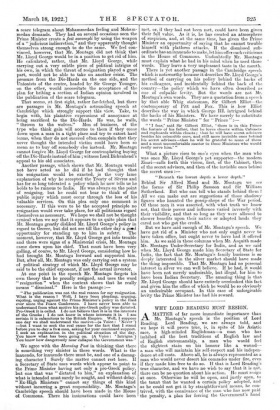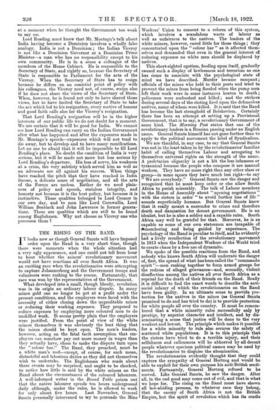WHY LORD READING MUST RESIGN.
AMATTER of far more immediate importance than Mr. Montagu's speech is the position of Lord Reading. Lord Reading, we are always told, and we hope it will prove true, is, in spite of his Asiatic race, a high-minded Englishman—a man who has imbibed all the best traditions of English law and of English statesmanship, a man who would feel the slightest stain on his honour like a wound— a man who will maintain his self-respect and his indepen- dence at all costs. Above all, he is always represented as a man who would never desert his comrades under fire, even if they made him free to do so. If that is Lord Reading's true character, and we have no wish to say that it is not, there can be no question about his action. He must resign at once. Otherwise he will be open, and justly open, to the taunt that he wanted a certain policy adopted, and as he could not get it by straightforward means, he con- trived, with the connivance of the man who has now paid the penalty, a plan for forcing the Government's hand at a moment when he thought the Government too weak to say no.
Lord Reading must know that Mr. Montagu's talk about India having become a Dominion involves a -wholly false analogy. India is not a Dominion ; the Indian Viceroy is not like a Dominion Governor or a Dominion Prime Minister—a man who has no responsibility except to his own community. He is in ,a sense a colleague of the members of the Home Cabinet. He is responsible to the Secretary of State, and rightly so, because the Secretary of State is responsible to Parliament for the acts of the Viceroy. When the Secretary of State has to resign because he differs on an essential point of policy with his colleagues, the Viceroy need not, of course, resign also if he does not share the views of the Secretary of State. When, however, he is found not only to have shared those views, but to have incited the Secretary of State to take the act which led to his resignation, every motive of honour and good faith calls also for the Viceroy's resignation.
That Lord Re,adiag's resignation will be in the higher interests of our public life we do not doubt for a moment. We are certain that it will be good for India. We cannot see how Lord Reading can carry on the Indian Government after what has happened and after the exposures made in Mr. Montagu's speech—exposures which will not tend to die away, but to develop and to have many ramifications. Let no one be afraid that it will be impossible to fill Lord Reading's place. No doubt the condition of India is very serious, but it will be made not more but less serious by Lord Reading's departure. His loss of nerve, his weakness at a crisis, the very subtlety which served him so well as an advocate are all against his success. When things have reached the pitch that they have reached in India finesse, a delicate sense of negotiation, and all the arts of the Forum are useless. Rather do we need plain- ness of policy and speech, stainless integrity, and honesty not because it is the best policy, but because it is instinctive. These qualities belonged to Lord Cromer in our own day, and to men like Lord Cornwallis, Lord William Bentinck and John Lawrence in former genera- tions. These are qualities which are still to be found among Englishmen. Why not choose as Viceroy one who possesses them



































 Previous page
Previous page